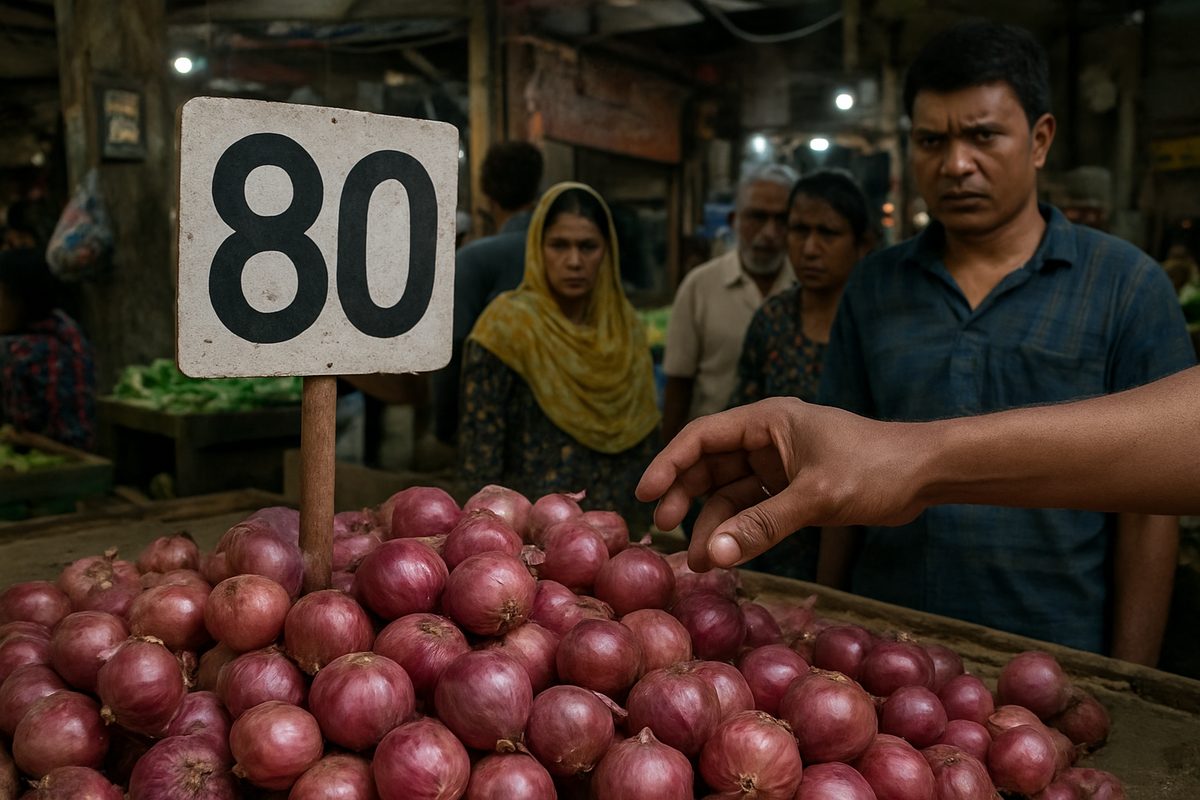Onion Prices Soar in Dhaka: Capital's Kitchens Feel the Pinch Amid Supply Crunch

Dhaka, Bangladesh – November 7, 2025 – The humble onion, a staple in Bangladeshi cuisine, has become a luxury item in the capital's kitchen markets, with prices rocketing to Tk 100-120 per kilogram. This dramatic surge marks a significant jump from previous weeks, leaving consumers frustrated and household budgets strained. The abrupt price hike is largely attributed to a severe supply crunch at the tail end of the harvesting season, exacerbated by a confluence of seasonal factors and unforeseen weather events.
The immediate implications are dire for the average Bangladeshi family, who rely heavily on onions for daily cooking. Retailers, too, are caught in a bind, forced to pass on increased wholesale costs to an already struggling customer base. As the nation heads into the crucial months before the new harvest, the question on everyone's mind is when, and if, relief will arrive for this essential commodity.
The Unfolding Crisis: Details, Timeline, and Market Reactions
The current crisis in Dhaka's onion markets has seen retail prices escalate sharply, now hovering between Tk 100-120 per kilogram. This represents a substantial increase of Tk 40-50 per kg within a mere week from the earlier Tk 70-80 range. The wholesale market mirrors this trend, with a 5-kg 'palla' (sack) nearly doubling in price from Tk 260 to Tk 520-540, effectively pushing wholesale rates above Tk 100 per kg. This rapid inflation has sparked widespread concern among consumers and retailers alike.
The timeline leading to this predicament points to a combination of cyclical and unexpected events. Historically, onion prices in Bangladesh tend to climb between late October and early December, a period bridging the old and new harvests. This year, however, the situation was compounded by heavy rainfall in early November, which severely impacted major onion-producing districts such as Pabna, Rajshahi, Faridpur, and Kushtia. These downpours damaged newly planted fields and delayed the harvesting of early varieties, disrupting the anticipated supply chain. Furthermore, some farmers, influenced by the rainfall and previous seasons' price volatility, either delayed planting or reduced the acreage dedicated to 'murikata' onions.
Several key players and stakeholders are at the heart of this unfolding scenario. Farmers, at the initial stage, have largely depleted their old-season stock, with only an estimated 10% remaining in the market, shifting control of supply to wholesalers. These wholesalers and retailers are the direct interface with consumers, and their pricing decisions significantly influence market dynamics. The Department of Agricultural Extension (DAE) monitors crop conditions, while the Ministry of Commerce is tasked with overseeing market stability and making decisions regarding imports. The Consumers Association of Bangladesh (CAB) has emerged as a vocal advocate for consumers, strongly alleging that the current price hike is artificially induced through market manipulation and hoarding by middlemen.
Initial market reactions have been characterized by frustration and a sense of helplessness. Consumers express anxiety over the affordability of an essential kitchen item, viewing the price surge as an added burden on already tight household budgets. Retailers, while acknowledging the higher procurement costs from wholesalers, often find themselves defending prices to disgruntled customers. Accusations of hoarding and market manipulation by middlemen are rampant, suggesting a breakdown of trust within the supply chain and a call for greater transparency and oversight.
Economic Ripple Effects: Winners, Losers, and Market Dynamics
The sustained high prices of onions are creating distinct winners and losers within the economic landscape, significantly altering market dynamics. In the immediate term, the primary beneficiaries appear to be wholesalers and middlemen, particularly those alleged to be involved in hoarding. By controlling the dwindling supply at the end of the harvesting season and capitalizing on import restrictions, these entities can command significantly higher prices, leading to inflated profit margins. Farmers who managed to hold onto a portion of their old stock until the price surge might also see increased earnings, though the majority have already sold their produce.
Conversely, the most significant losers are undoubtedly consumers. Households across the capital are facing increased expenditure on a basic necessity, forcing them to either reduce consumption, seek cheaper alternatives (if available), or reallocate funds from other essential needs. This directly impacts their purchasing power and overall quality of life. Retailers, particularly smaller kitchen market vendors, also find themselves in a precarious position. While they must sell at higher prices, their profit margins might not increase proportionally due to higher procurement costs, and they bear the brunt of consumer frustration and reduced sales volumes as demand softens under the high prices.
The food service industry, including restaurants, street food vendors, and caterers, is also feeling the pinch. Onions are a fundamental ingredient in Bangladeshi cuisine, and their exorbitant cost directly increases operational expenses. This pressure might lead to higher menu prices for consumers, reduced portion sizes, or a shift towards less onion-intensive dishes, ultimately impacting their profitability and customer satisfaction. The Department of Agricultural Extension (DAE) and the Ministry of Commerce face a loss of public trust and increased pressure to stabilize the market, highlighting the challenges of managing essential commodity prices in a volatile environment. The current scenario also underscores the vulnerability of a market heavily reliant on domestic production and susceptible to seasonal fluctuations and external factors like import policies and international prices.
Broader Implications: Trends, Regulations, and Historical Parallels
The ongoing onion price crisis in Bangladesh's capital is not an isolated incident but rather fits into broader industry trends concerning essential commodity markets, particularly in developing economies. It highlights a persistent challenge of balancing domestic production with import reliance, ensuring food security, and protecting consumers from price volatility. The event underscores the fragility of agricultural supply chains, which are increasingly susceptible to climate change impacts, as evidenced by the heavy rainfall damaging early crops. This trend of weather-induced supply shocks is likely to become more frequent, demanding greater resilience in agricultural planning and infrastructure.
The ripple effects of this crisis extend beyond the immediate onion market. It puts pressure on the government to review its import policies, specifically the year-long import ban. While such bans aim to protect local farmers, they can backfire when domestic supply falters, leading to market shortages and price spikes. The higher prices in neighboring India further complicate any potential import decisions, as sourcing onions internationally would still be costly. This situation also prompts questions about market regulation and oversight. Accusations of hoarding by middlemen suggest a need for stricter enforcement against illicit practices that artificially inflate prices, potentially leading to new policy measures or increased scrutiny from consumer protection agencies.
Historically, Bangladesh has faced similar crises with onion prices, often triggered by supply disruptions, import restrictions, or speculative hoarding. These past events serve as stark reminders of the need for robust buffer stocks, diversified import sources, and efficient supply chain management. Comparisons can be drawn to previous years where onion prices surged, prompting emergency import measures or government interventions to stabilize the market. Each recurrence reinforces the lesson that relying solely on seasonal domestic production without adequate contingency plans can leave the market vulnerable to shocks. This event could also influence future agricultural policies, pushing for greater investment in storage facilities, crop diversification, and early warning systems for weather-related risks to mitigate such crises.
Looking Ahead: Short-Term Relief and Long-Term Strategies
The immediate outlook for Dhaka's onion market offers a glimmer of hope, albeit with a cautious wait-and-see approach. Short-term relief is anticipated with the arrival of early varieties of 'murikata' onions, expected to enter the market by early to mid-December. While there were initial concerns about delayed planting and harvesting due to heavy rainfall, the Department of Agricultural Extension (DAE) maintains that the overall impact on the 'murikata' supply may not be severe, as these onions are typically cultivated on elevated land, reducing the risk of waterlogging. However, the exact volume and timing of this new harvest will be crucial in determining the extent of price moderation.
In the long term, this crisis underscores the need for more robust and resilient strategies to ensure stable onion supply and price. Potential strategic pivots include the government re-evaluating its year-long import ban, possibly implementing a more flexible import policy that allows for timely imports during periods of domestic scarcity without undermining local farmers. There's also a clear market opportunity for investments in advanced storage facilities that can preserve onions for longer periods, thereby extending the availability of domestic stock beyond the harvesting season and reducing reliance on imports during lean months.
Emerging challenges include the increasing unpredictability of weather patterns due to climate change, which necessitates greater investment in climate-resilient farming practices and diversified agricultural production. The Ministry of Commerce will continue to play a pivotal role, closely monitoring the market and assessing the new harvest's volume before making any definitive decisions regarding onion imports. Potential scenarios range from a gradual price reduction if the 'murikata' harvest is robust, to continued high prices if the new supply is insufficient or if market manipulation persists. Ultimately, a multi-pronged approach involving strategic imports, improved storage, enhanced agricultural resilience, and stricter market oversight will be essential to prevent future recurrences of such price volatility.
Concluding Thoughts: Navigating Volatility in the Essential Commodity Market
The current onion price surge in Dhaka serves as a critical reminder of the delicate balance within essential commodity markets and the profound impact price volatility can have on everyday lives. The crisis, driven by a combination of seasonal supply depletion, adverse weather conditions, import restrictions, and allegations of market manipulation, highlights the intricate web of factors that influence food prices. Key takeaways include the vulnerability of domestic supply chains to external shocks, the need for proactive government intervention, and the significant burden placed on consumers when staple food items become unaffordable.
Moving forward, the market's stability hinges on the success of the upcoming 'murikata' onion harvest and the decisive actions of regulatory bodies. While short-term relief is anticipated with new arrivals, the lasting impact of this event will likely be a renewed focus on long-term strategies for food security. This includes re-evaluating trade policies, investing in agricultural infrastructure like cold storage, and strengthening market surveillance to curb speculative practices.
Investors and policymakers should watch for several indicators in the coming months: the actual volume and quality of the 'murikata' harvest, any announcements from the Ministry of Commerce regarding import policies, and the effectiveness of measures taken to address market manipulation. The resilience of the supply chain for essential commodities will be a continuous challenge, and this latest onion crisis underscores the urgency for comprehensive, adaptive strategies to ensure affordability and availability for all. The lessons learned from this period of scarcity must inform future agricultural and trade policies to build a more stable and equitable food market for Bangladesh.
This content is intended for informational purposes only and is not financial advice



